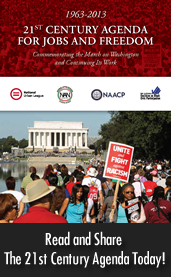History:
The local charter (Urban League of Greater Columbus, Inc.) was established in 1971 by multi-racial business and community leaders.
Established in 1910, The National Urban League is the nation's oldest and largest community- based movement devoted to empowering African Americans to enter the economic and social mainstream. Today, the National Urban League, headquartered in New York City, spearheads the non-partisan efforts of its local affiliates. There are over 100 local affiliates of the National Urban League located in 35 states and the District of Columbia providing direct services to more than 2 million people nationwide through programs, advocacy and research.
Historical Information
The Metro Columbus Urban League (MCUL) was born out of the seeds of discontent and the attempt at reconciliation. During the summer of 1971, Columbus was plagued by a series of fights and fire bombings which had racial underpinnings. Mayor J.R. Allen, with council from Governor Jimmy Carter, sought a measure that would not only strike at the heart of the racial tensions, but also be acceptable to both the white and black communities. The end product was the formation of a bi-racial committee comprised of 13 members: Andrew B. Speed, Johnnie H. Flakes, Rudolph Allen, Margaret L. Belcher, Bud Rufner, Nolan Murrah, Jack Basset, William B. Turner, Frances Jones, Sidney Battle, Frank Robinson, George Ford, and J.C. Metcalf. These members represented a cross section of Columbus in terms of race, gender and age. They were charged with the task to develop a sound and functional strategy that would foster greater communication between Columbus as a whole - black and white.
After weeks of fact finding, the Committee of 13 or the "Baker's Dozen" found that underlining the tensions and the rhetoric of race was the feeling of alienation and hopelessness in economic development and employment for minorities. The "Baker's Dozen" saw in the National Urban League movement the most prudent and practical means of alleviating the tensions which burned at a fever pitch. Inviting a national organization to solve the local predicament was a novel idea for many, but fears where allayed after the degree of local autonomy and successes of the Urban League's affiliate chapters in other cities with similar problems were reported.
By the end of 1971, the slate had been cleared for the arrival of an affiliate chapter of the National Urban League in Columbus. In August, the Columbus Chamber of Commerce, which boasted itself as being made up of the "management, manpower and money" had endorsed the prospect of an affiliate chapter and was quickly followed by the Columbus City Council on September 3rd. And on September 7th, the first step was taken as Sidney Battle with the assistance of several volunteers manned a "Jobs Office" in a mobile trailer at the corner of 5th Avenue and 12th Street. The ensuing months would see more positive steps as the Metro Columbus Urban League was formally incorporated in the state of Georgia and a 33 member Board of Directors was established. Other civic and social organizations soon gave their support, such as the Kiwanis Club and the Columbus Personnel Association.
The task of organizing an affiliate Urban League would be completed in January 1972 when the application to the National Urban League was accepted and ratified. Jessie Taylor, Director of Economic Development Department of the Buffalo Urban League, was soon after hired as the MCUL's first Executive Director. With an executive director and staff in place, the doors to the MCUL formally opened on March 6, 1972 at 1214 First Avenue.
Since its inception, the MCUL has strived to benefit the entire community by using the process of education, referral and community organization to improve the working and living conditions in Columbus and its immediate surrounding areas. Focusing on its four primary program areas : Economic Development and Employment, Housing, Education, and Health and Social Services, the MCUL has been the vehicle for various programs to ensure that the dream of "One Columbus" replaces the nightmare of that hot summer in1971.









